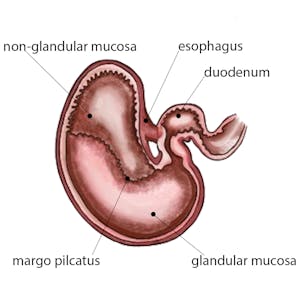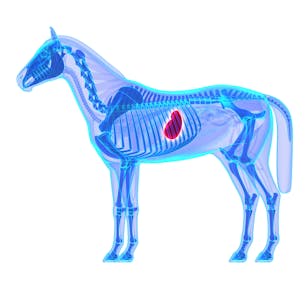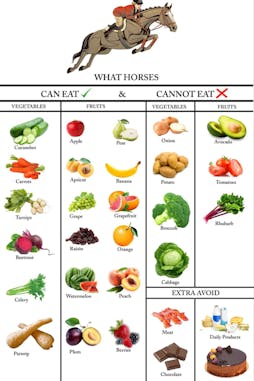
stomach info...
A horse's stomach is a key component of its digestive system, which allows them to process and extract nutrients from the food they consume. Here's some information about a horse's stomach:
a horses Stomach Size and Capacity...
The horse's stomach is relatively small compared to its overall body size. On average, it can hold around 8 to 15 liters (2 to 4 gallons) of content. Despite its smaller size, a horse's stomach is designed to hold small, frequent meals throughout the day, as horses are grazing animals by nature.
Simple Stomach...
Horses have a monogastric or "simple" stomach, similar to humans and other non-ruminant animals. This means that food passes through a single chamber, where initial digestion and enzymatic breakdown of feed occur.
Acid Production...
The horse's stomach secretes hydrochloric acid, which plays a vital role in breaking down food particles and killing bacteria. Horses are known for producing stomach acid continuously, regardless of whether they are eating. This is why it is essential for horses to have a relatively constant intake of food to prevent excessive acid buildup, which can lead to gastric ulcers.
Limited Storage Capacity...
Horses have evolved as grazing animals, and their digestive systems are adapted to process small amounts of fibrous food frequently. They are not well-suited to handling large, infrequent meals. Feeding a horse large quantities of concentrated feed all at once can overwhelm the stomach's capacity and lead to digestive issues.
Gastric Ulcers...
Gastric ulcers are a common concern in horses, especially those subjected to stressful situations or those that undergo intense training and competition. Stress, irregular feeding schedules, and high-concentrate diets can contribute to the development of gastric ulcers. These ulcers are lesions that form in the stomach lining due to excessive stomach acid exposure.
Continuous Feeding...
To maintain a healthy stomach and prevent issues like gastric ulcers, it is essential to provide horses with a diet that mimics their natural grazing behavior. Horses should have access to forage (hay or pasture) throughout the day, which encourages continuous eating and saliva production, helping buffer stomach acid.
Prohibited Foods...
Horses are hindgut fermenters, which means they have a specialised large intestine that can break down fibrous materials. However, there are certain foods that should be avoided as they can disrupt the delicate balance of the horse's digestive system, such as high-starch, high-sugar feeds, moldy or spoiled feed, and plants that are toxic to horses.
Maintaining a proper feeding regimen, providing access to clean water at all times, and managing stress levels are essential for promoting a healthy stomach and overall digestive health in horses. Regular check-ups by a veterinarian and consultation with an equine nutritionist can help ensure that a horse's dietary needs are being met for optimal well-being.






